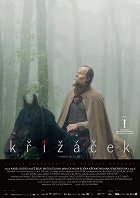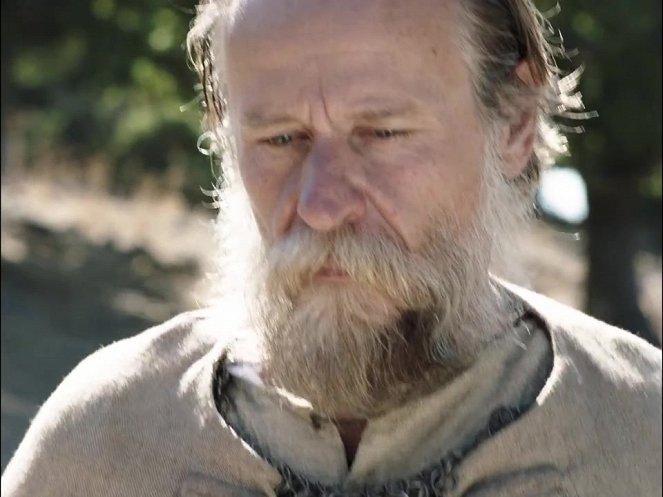Réalisation:
Václav KadrnkaPhotographie:
Jan Baset StřítežskýActeurs·trices:
Karel Roden, Aleš Bílík, Matouš John, Jiří Soukup, Michal Legíň, Jana Oľhová, Ivan Krúpa, Eliška Křenková, Tomáš Bambušek, Petr Cemper (plus)Résumés(1)
The knight Bořek sets off on the trail of his missing son. Little Jan has run away from home, rushing after a dream, an illusion about the holy mission of children. His aging father searches for him in every possible way, trying to catch up with his son. But he arrives everywhere too late, finding only witnesses who say they have seen the boy. He manages to glean some scraps of information from them and tries to use them to piece together his son's fate. He even projects his lost son onto children he encounters on his journey. Gradually his image of the boy becomes more blurred; Bořek's state of mind starts to crumble and the landscape through which he travels ever onwards increasingly resembles his mental landscape. The only material evidence he finds are items associated with Jan: his little sword and christening coin. These are real clues but he is unable to assess them properly. In the end he is unable to distinguish between reality and a theatrical representation of the myth. (CinemArt)
(plus)Critiques (9)
Poésie cinématographique avec une belle composition en 4:3 (qui n'inclut que l'essentiel à l'image), des insertions créatives de réalisation (utilisation du son d'une fenêtre qui claque) et une conclusion ambiguë qui laisse le spectateur réfléchir. Un récit lent, prolongé, mais harmonieux et compact. Exclusivement destiné aux spectateurs les plus exigeants, envoûtés par Tarkovski ou Tarr. P.S. : Pourquoi n'ont-ils pas choisi une image en noir et blanc ? Le spectateur lambda n'y serait pas allé de toute façon, et en jouant avec la lumière et les ombres, cela aurait pu toucher encore plus la cible.
()
There was only one Vláčil, this doesn't even come close. It's not a pose to say that I really like slow-moving films with an emphasis on atmosphere, but this one wasn't atmospherically slow, just annoyingly slow, and in the first half it was visually like a production of the Brno Czech Television Studios, full of static declaiming dummies. Just the kind of post-revolutionary pseudo-art by a fresh FAMU graduate who thinks he’s the shit :o)
()
The Little Crusader delivered what I expected. It satisfied me visually. And it brought a bit of the Middle Ages into Czech film, which never hurts. It’s just a pity that it was made in such an artsy way as in this movie. It is obvious that the ordinary consumerist audience will not be able to appreciate the Little Crusader’s approach. Slow pace of the narration, static shots, zero storyline… we get all of that in the Little Crusader. Despite that I still took a certain liking to it; perhaps it was the connection of the atmosphere and the music, which made me keep watching it and wait where next the creators will take me in Medieval Europe.
()
The comparison of film to Plato’s Cave is quite fitting, but in the case of Little Crusader, it’s appropriate in the sense that the shadows come to life thanks to the fact that the audience itself is projected into them. Those who connect with their own parental anxieties at the beginning are ahead of the game. For others, the fundamental obstacle is the absolute vapidity of the characters and the lack of any tension that would spark viewers’ attention as in other, similarly stylised films. However, Kadrnka and co. placed in front of viewers several obstacles that can draw their interest to somewhere completely different. In practice, the film is rather more reminiscent of a happening, where it soon becomes more interesting and entertaining to not watch the screen, but to observe the screening room or try to tune in to the film and watch it only as a mechanical form. Little Crusader is not a flawless film, but it is good that it was made and that it got the grand prize at the Karlovy Vary International Film Festival. It invites us to recall the fundamental argument of the heated debates around genre production in Germany: Is it okay when ten imperfect genre films are made instead of a single excellent one? Yes, because cinema is not a collection of isolated exceptional works, but an entire interconnected world whose inhabitants stimulate each other.
()
A meditative journey taken by a devastated father to find a lost son is unexpectedly convincing, for a Czech movie. Visually and in terms of production design it can compete with foreign productions, although in places it’s terribly drawn-out and boring. The quest for longer footage is masked by artistic intention, but after a while it becomes very obvious. the ever reliable Roden, mostly silent with a gloomy expression on his face, doesn’t get the chance to impress us with his acting. The fact that the movie ends without any lesson whatsoever is disappointing. Daring, yes, satisfying, not really. Also the TV channel has locked aspect ratio settings, which makes watching a little unpleasant. P.S: The “road movie" subtitle was added just to attract attention. No road appears in this movie.
()
It is a joy to see such a bold adaptation of Vrchlický. This one is only associated with A Night at Karlštejn, which is really too bad. It’s a spiritual experience suitable for recommendation to viewers who like to reflect on what they have seen.
()
Une grande bulle bouffie et une pièce d’art minimaliste au sens le plus mauvais et pénible du terme.
()
Du point de vue de la tentative de réalisation d'une fresque cinématographique artistique méditative, dont l'histoire est plutôt une parabole sur la responsabilité parentale, Křižáček est sans précédent pour les normes tchèques. En tant que film, cependant, il a la chance d'attirer uniquement par son aspect visuel, peut-être par la caméra et la performance de Karel Roden, dont le personnage du père à la recherche de son fils perd la raison au cours du film, mais c'est tout. Son intrigue simple, désespérément vide du point de vue de la réflexion et du contenu, inspirée du poème épique de Jaroslav Vrchlický, est tellement étirée et ses scènes sont tellement excessivement longues qu'il est tout simplement impossible de ne pas s'ennuyer. Étirer le matériel d'une demi-heure à une durée triple n'est pas une bonne voie, car l'art cinématographique ne repose pas automatiquement sur la capacité des cinéastes à filmer l'ouverture et la fermeture d'un pont-levis de manière à ce que cela prenne trois minutes dans le film. Deux tiers du film sont constitués de plans de Roden, morose à cheval, et le reste est assuré par des enfants avec des branchages de palmiers, il ne reste plus qu'à l'audience de tenter d'interpréter ce qu'elle voit à l'écran et à rechercher différentes significations. Les dialogues sont naturellement rares, car ce road-movie de chambre sur les croisades devait être raconté principalement à travers l'image, mais il n'y a vraiment pas grand-chose.
()
I am thrilled that such a treasure as Václav Kadrnka and his film Little Crusader can emerge in contemporary Czech cinema. It evokes to me the magnificent films of František Vláčil, which is also a way of expressing my conviction that in black and white this work would be almost perfect. (80%)
()

